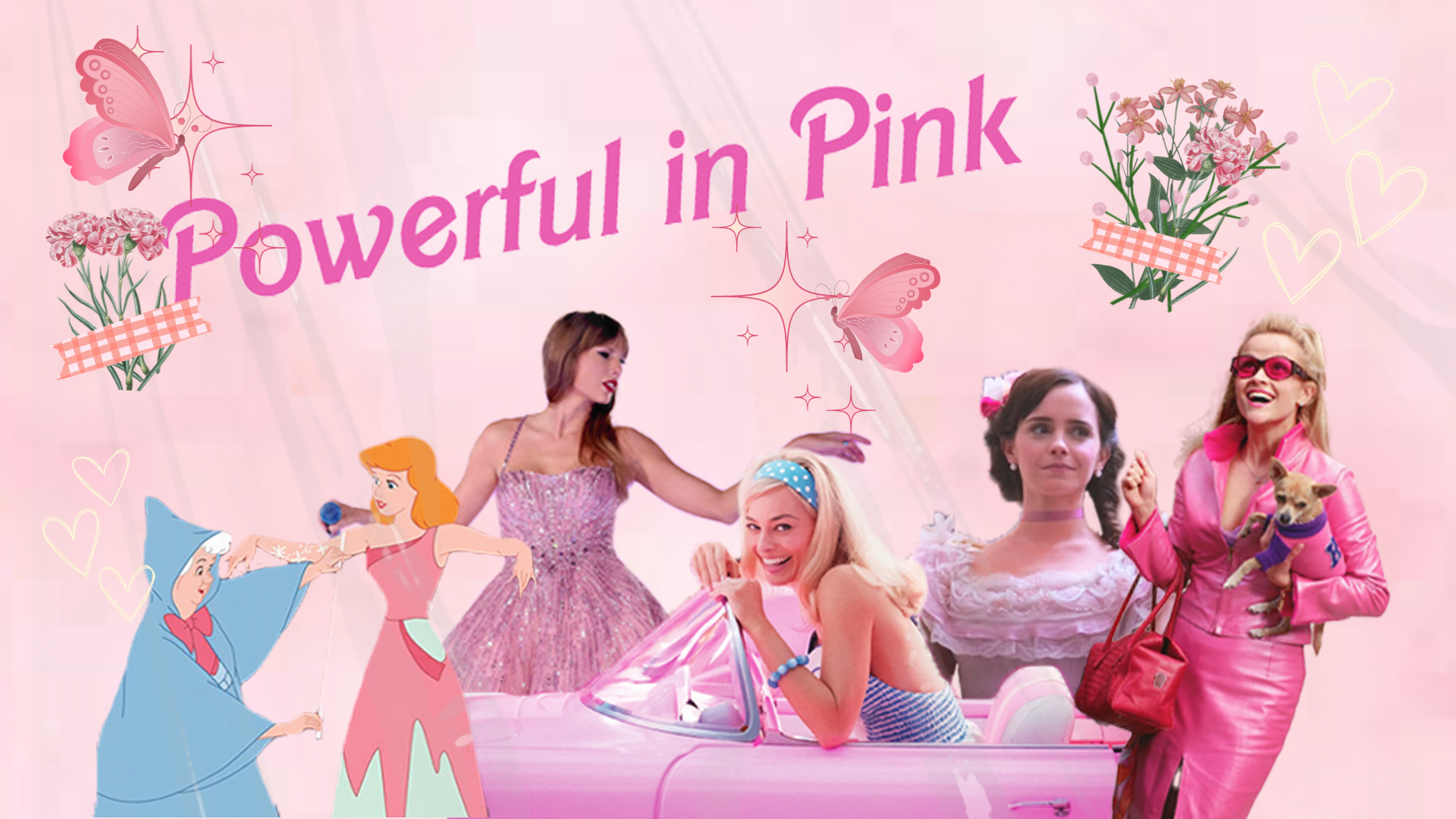Opinion | Femininity is strength, pink is empowering
Hyper feminine women in the media are depicted as weak and perceived as anti-feminist, but all forms of femininity should be celebrated rather than criticized. Photo collage by EMILY PARIS, Photo Editor
Taylor Swift said something in her 2020 Netflix documentary “Miss Americana” that has stuck with me ever since.
She said: “I wanna love glitter, and also stand up for the double standards that exist in our society. I wanna wear pink, and tell you how I feel about politics. I don’t think those things have to cancel each other out.”
As someone who loves the color pink — on everything — and who is also a politics editor and an American citizen who likes to stay informed, Swift’s words really spoke to me.
Why does it always have to be one or the other?
Taylor Swift is not, by any means, the first person to have spoken about this, and “Miss Americana” was not the first movie to explore this idea.
My earliest encounter with this stereotype that women can be feminine or serious was in my own girlhood with the 1950 Disney classic, “Cinderella.” Her story has notoriously received criticism for not being “feminist enough,” and her character has recurringly been labeled as “weak” and “helpless.”
What those criticisms miss, is that Cinderella, as someone who has received years of abuse and neglect from her family, still manages to go through life with grace and compassion for others.
I find that Cinderella’s kindness was unfaltering, and no one can argue that she wasn’t a hard worker. Isn’t this empowering? Aren’t these values that we should be encouraging young girls to aspire to be?
Nicole Kavros, Politics Editor
Why does a woman have to act a certain way and want certain things, just to be seen as a good role model to other girls? Why are we so quick to label women as “bad” feminists?
It feels like society has a mold for women, specifically hyper feminine women, that they want us to squeeze ourselves into. Feminine women are expected to be weak, and it’s unsettling to some when they aren’t.
When I tell people that Meg was my favorite character in the 2019 film “Little Women,” they seem surprised. I remember when the movie first came out, fans were disappointed with Emma Watson for taking the role. Watson, a longtime advocate for women’s rights, portraying a woman who chooses to marry and have kids? People thought she’d gone mad.
Feminism and female empowerment, at least to me, is believing that women should have the right to choose what they get to do with their lives. And that’s exactly what Meg did, so why do we criticize her for it?
As the movie points out, Meg has different desires for her life than her sisters, but they are just as important. It doesn’t make her any less brave, any less valuable or any less empowering as a character.
When we start to shame women for the life they choose to lead, that’s when we revert to anti-feminism. Femininity should not be viewed as a dichotomy to strength. Women and power can, and very often do, co-exist.
When I was a little girl watching the 2001 film “Legally Blonde,” I felt inspired by Elle Woods: a protagonist who consistently wears pink and gets a nearly perfect score on her LSAT. She will forever be iconic.
But Elle faces challenges in her academic journey because of her personal style — even after she proves herself more than worthy to be there.
As a woman in higher education, I’ve felt the bruise of these stereotypes. I’ve been in situations where my ability has been judged by others based solely on how I present myself. I’ve had to jump through hoops twice as high as others to prove my worth.
Why does the world expect so little of hyper feminine women in media and in real life? Why does displaying femininity equate to inability or a lack of intelligence?
Recently, “Barbie” came out as a perfect example of an empowering character breaking out of the mold that society has tried to force women into.
Margot Robbie’s character wears a lot of pink, while also displaying strength and bravery to accomplish her goals. Just because she’s hyper feminine doesn’t mean she isn’t a strong, empowering main character.
“Barbie” has gotten people talking about this false dichotomy between femininity and empowerment. It’s becoming more accepted to express femininity without being underestimated. Finally.
In my dream world, femininity would stop being used against women. Rather, it would start being accepted as a valued aspect of their character, right along with their ideas and potential.
It’s time to show girls that anyone can be an empowered woman and to stop holding women — even the ones covered in head-to-toe pink and glitter — back from reaching their full potential.


